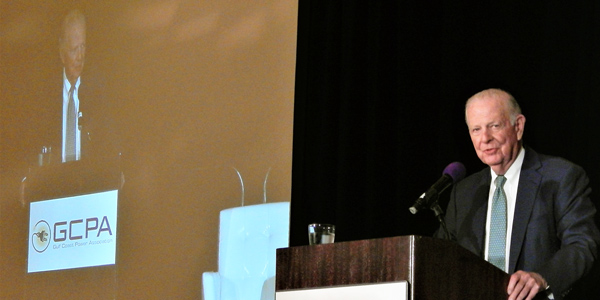By Tom Kleckner
HOUSTON — Approaching his 89th birthday, James A. Baker III last week revealed the enduring sharpness of his political mind with a keynote address that delved into personal history, decried the “bankruptcy of our national public debate” and offered a middle ground to address climate change.
Baker made his name in Republican politics, running campaigns for Gerald Ford and George H.W. Bush. He ran the White House staffs for both Ronald Reagan and Bush and served as their secretary of the treasury and state, respectively.
Last year, Baker partnered with George Schultz, Hank Paulson and several other luminaries in promoting the “Carbon Dividends” plan, a “new climate strategy” that purports to strengthen the American economy, reduce regulation, help working-class Americans, shrink government and promote national security.
“At the risk of tooting my own horn, I do know a little bit about politics,” Baker said. “It’s obvious to me this solution should be able to attract support from those on both sides of our political debate.”
The plan rests on four pillars: a gradually increasing carbon tax; carbon dividends for all Americans; border carbon adjustments; and significant regulatory rollback.
Baker and his coauthors propose to begin with a “sensible” $40/ton carbon tax that would steadily increase over time. “Every dime” of the proceeds would be returned to citizens, giving the theoretical family of four $2,000 in carbon dividend payments in the first year.
“In my view, that would not be a true tax,” Baker said. “The plan speaks to the frequent frustration about economic insecurity expressed by most Americans. These measures, to be viable, have to take into account the impact of economic growth to human welfare.
“They must be politically sustainable,” he said, emphasizing the importance of that point. “Make no mistake, politics is about gaining and exercising power. That’s why political parties exist. That’s why we have campaigns and elections. Power should be a means to implement policies that advance freedom, security and the well-being of our citizens.”
Baker said he recently took a call from former Secretary of State John Kerry, “who said he might be able to sign on to [the plan] too.”
“The moment may never be more right,” Baker said. “If we spend too much time debating the role of climate change, we may find ourselves rehashing the same political arguments that have poisoned our debate. Our plan can be seen as a really good mainstream policy, just in case the Al Gores of the world happen to be right.”





